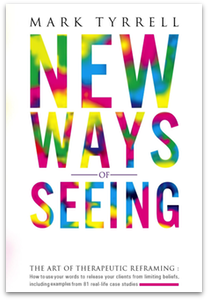Early learning – or should I say mislearning – can create a habit of self-sabotage to the point where things actually ‘going right’ may seem like a scary foreign land. So what are some basic strategies we can use to help the self-sabotaging client and avoid this self-fulfilling prophecy?
Get Free Therapy Techniques in Your Email Inbox Every Week
If you are a therapist or coach of any persuasion; counsellor, psychotherapist, hypnotherapist, life coach, bodyworker, in fact anyone who works in the helping professions, you will glean valuable, actionable ideas, tips and techniques from Clear Thinking, my free therapy techniques newsletter.
What is a Healthy Personality?
When we treat clients, we’re not seeking to change their personality. But we are seeking to help them adapt and modify troublesome personality traits. Personality can, and perhaps inevitably does, change through experience. But what exactly should we be aiming for?
How to Use Mirror Therapy With Your Clients
To gain some objectivity on ourselves – without the distorting effects of chronic hubris, pride, conceit, and narcissism and without disabling low self-esteem or undue sensations of inferiority – allows us to live more fully, more authentically. So how can we help our clients to do this?
How Can We Help Those with Acute Guilt and Remorse?
This discussion from one of our monthly Q&As is about the chronic contrition, regret, remorse, and guilt of a 12-year-old boy with an almost monastic sense of needing to confess his ‘sins’.
How to Help Clients Stop Taking Things Personally
To take things personally when we’d be better off not to is to make things much harder for ourselves. So how can we help clients modify sensitivity and feel less threatened by perceived criticisms or slights?
How to Deal With Crazy Hypnosis Requests
Couple ignorance about hypnosis with a desire for magical control over others and we have a recipe for crazy demands. So how can we deal with these kinds of demands?
Research Roundup 18
Wisdom isn’t a mere compilation of facts, acquired then put aside, only to be brought out occasionally to impress others like some family heirloom. I think we become wiser when we are able to make sense of what we know, contextualize it, and see where it fits in the bigger picture.
How to Use What Your Depressed Client Brings
Clients bring into therapy their miseries and limitations. But they also bring their potential, past triumphs, interests, and incipient and past happinesses. We can utilize much of this, and we should – because this is the very material from which we can help our clients build happier lives.
7 Steps to Help Your Client Resist Guilt Manipulators
If our guilt-manipulated clients can start to respond differently to those who manipulate them, they will effectively change the relationship dynamic, feel more of a sense of healthy control, and move the relationship further towards a healthy, genuinely reciprocal balance for both parties.
6 Key Social Skills to Teach Your Shy Clients
Relationships are what bring meaning to most people’s lives. Social connection matters to both health and happiness. Whatever our natural tendencies, we can all learn to be better socially. So what social skills might we want to help our socially unskilled clients develop?















